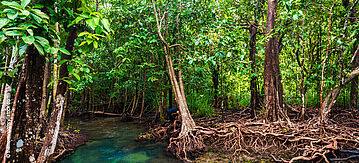TEEB

Nature provides mankind with a range of goods and services which form the basis of human well-being. Intact soils, food, drinking water, fuels, medicines, protection from flooding and soil erosion, climate regulation and carbon storage are all ecosystem services which nature gives us free of charge.
Up to now, many of nature's services have either been taken for granted or not been factored into economic assessments. However, these ecosystem services and biological diversity have a high economic value.
To allow a better assessment of the economic value of nature's services, identify the economic impacts of damage to ecosystems, and thus put a figure on the costs of inaction, Germany joined with the EU Commission to initiate the study The Economics of Ecosystems and Biodiversity (TEEB) during its 2007 G8 Presidency. The study has been carried out under the auspices of the United Nations Environment Programme (UNEP). Indian economist Pavan Sukhdev leaded the TEEB study.
Additional TEEB reports
A number of additional TEEB reports were drawn up to support the application of TEEB in various sectors and biomes. In 2009, TEEB Climate Issues Update was published, which focuses on climate-relevant economic aspects of biodiversity. This report served to support the dialogue in the run-up to the 15th meeting of the Conference of the Parties to the Framework Convention on Climate Change in Copenhagen. In 2011, the TEEB Manual for Cities came out, which was based on TEEB for Local and Regional Policy Makers and pointed out how cities can directly benefit from the evaluation of ecosystem services. TEEB for Oceans was published on the occasion of the World Oceans Summit in 2012. Another report was compiled for the UN conference on Sustainable Development Rio+20. That report deals with nature and its role in the transition to a green economy in the context of sustainable development. These reports were followed in 2013 by TEEB for Water and Wetlands, which had been initiated by the Secretariat of the Ramsar Convention.
Summary of TEEB reports
TEEB for Policy Makers
TEEB for Policy Makers underlines the urgent need to improve knowledge and awareness of the social and economic dimension of the loss of biological diversity. The report aims to assist policy makers in reaching informed decisions on nature conservation and sustainable economic development. A key statement of the report is that investments in the conservation and restoration of ecosystems are a cost-efficient way of increasing resilience against the impacts of climate change and natural disasters, and of improving food security, poverty alleviation and economic development. The report also makes clear that conserving ecosystems is nearly always more cost-efficient than having to restore them later. For example, the cultivation and conservation of almost 12,000 hectares of mangrove forests in Vietnam cost 1,1 million US dollars, but at the same time saved 7,3 million US dollars in maintenance costs for dykes.
Using numerous concrete examples from all over the world, TEEB demonstrates how the value of nature and its services can be incorporated into political decision making. The report provides policy makers with a tool box which must now be used and adapted to specific national needs.
TEEB for Business Report
TEEB for Bunsiness Report states that the ongoing loss of biodiversity and its services is also worrying for the business sector, which increasingly realises that Earth's natural resources have real economic value and offer business opportunities and revenues. According to estimates, the loss of biodiversity adds up to several trillion dollars and thus influences markets and consumers more and more. For example, consumers are showing a growing interest in environmentally friendly products and services including those that conserve biodiversity. 60 percent of consumers in America and Europe and more than 90 percent of Brazilian consumers are aware of the problem of biodiversity loss. More than 80 percent of consumers worldwide do not wish to buy products in future from companies which neglect ecological and social aspects in their corporate policy.
The TEEB report concludes that enterprises can only live up to current market requirements if they integrate a sustainable biodiversity management in their corporate strategy. TEEB suggests that enterprises apply concepts such as No Net Loss, Ecological Neutrality or Net Positive Impact. It also calls for an improved balancing of both positive and negative business impacts on biodiversity in order to prompt changes in corporate investments and organisation. For this purpose the report recommends that trade associations and balance sheet experts develop new instruments such as common standards and key figures for enterprises.
